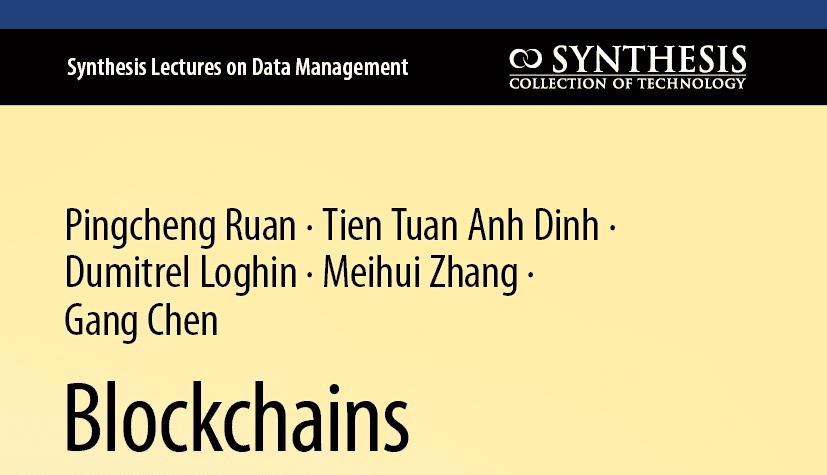Research
We conduct state-of-the-art research on blockchain, smart contracts, and related data management systems.
Our research are published in top-tier academic conferences and journals.
Published Papers

Secure and Verifiable Data Collaboration with Low-Cost Zero Knowledge Proofs
2024Organizations are increasingly recognizing the value of data collaboration for data analytics purposes. Yet, stringent data protection laws prohibit the direct exchange of raw data. To facilitate data collaboration, federated Learning (FL) emerges as a viable solution, which enables multiple clients to collaboratively train a machine learning (ML) model under ...

Characterizing the Performance and Cost of Blockchains on the Cloud and at the Edge
30 May 2024While state-of-the-art permissioned blockchains can achieve thousands of transactions per second on commodity hardware with x86/64 architecture, their performance when running on different architectures, such as ARM, is not clear. The goal of this work is to characterize the performance and cost of permissioned blockchains on different...

Toward Intention Discovery for Early Malice Detection in Cryptocurrency
29 January 2024Cryptocurrency's pseudo-anonymous nature makes it vulnerable to malicious activities. However, existing deep learning solutions lack interpretability and only support retrospective analysis of specific malice types. To address these challenges, we propose Intention-Monitor for early malice detection in Bitcoin....

Managing Metaverse Data Tsunami: Actionable Insights
16 January 2024In the metaverse the physical space and the virtual space co-exist, and interact simultaneously. While the physical space is virtually enhanced with information, the virtual space is continuously refreshed with real-time, real-world information. To allow users to process and manipulate information seamlessly between...

From Asset Flow to Status, Action and Intention Discovery: Early Malice Detection in Cryptocurrency
09 December 2023Cryptocurrency has been subject to illicit activities probably more often than traditional financial assets due to the pseudo-anonymous nature of its transacting entities. An ideal detection model is expected to achieve all three critical properties of early detection, good interpretability, and versatility for...

Baldur: A Hybrid Blockchain Database with FPGA or GPU Acceleration
23 June 2023In the last decade, blockchain technologies have entered the enterprise space in the form of permissioned blockchains, verifiable databases, and hybrid blockchain database systems (HBDB). The core of these blockchain technologies is represented by cryptography operations such as secure hashing typically with SHA-3 algorithms...

BBSF: Blockchain Benchmarking Standardized Framework
23 June 2023In this paper, we propose the Blockchain Benchmark Standardized Format (BBSF), a framework for standardized, transparent, and fair benchmarks for blockchains. BBSF enables users and developers to compare blockchain platforms using metrics derived from realistic workloads....

VeDB: A Software and Hardware Enabled Trusted Relational Database
20 June 2023Blockchain-like ledger databases emerge in recent years as a more efficient alternative to permissioned blockchains. Conventional ledger databases mostly rely on authenticated structures such as the Merkle tree and transparency logs for supporting auditability, and hence they suffer from the performance problem....

FEAST: A Communication-efficient Federated Feature Selection Framework for Relational Data
30 May 2023Vertical federated learning (VFL) is an emerging paradigm for cross-silo organizations to build more accurate machine learning (ML) models. In this setting, multiple organizations (i.e., parties) hold the same set of samples with different features....

Interoperability in Blockchain: A Survey
11 May 2023This paper presents a systematic and comprehensive survey on blockchain interoperability, where interoperability is defined as the ability of blockchains to flexibly transfer assets, share data, and invoke smart contracts across a mix of public, private, and consortium blockchains without any changes to the underlying blockchain systems. ...

VeriBench: Analyzing the Performance of Database Systems with Verifiability
01 May 2023Database systems are paying more attention to data security in recent years. Immutable systems such as blockchains, verifiable databases, and ledger databases are equipped with various verifiability mechanisms to protect data....

GlassDB: An Efficient Verifiable Ledger Database System Through Transparency
01 February 2023Verifiable ledger databases protect data history against malicious tampering. Existing systems, such as blockchains and certificate transparency, are based on transparency logs --- a simple abstraction allowing users to verify that a log maintained by an untrusted server is append-only. ...

The Metaverse Data Deluge: What Can We Do About It?
14 Jun 2022In the Metaverse, the physical space and the virtual space co-exist, and interact simultaneously. While the physical space is virtually enhanced with information, the virtual space is continuously refreshed with real-time, real-world information. To allow users to process and manipulate information seamlessly between the real and digital spaces, novel technologies must be developed. ...

LedgerView: Access-Control Views on Hyperledger Fabric
11 June 2022We present LedgerView -- a system that adds access control views to permissioned blockchains. The approach is motivated by an AT&T application of tracking refurbished devices. A blockchain is a decentralized tamper-resistant ledger managed by a group of peers....

Hybrid Blockchain Database Systems: Design and Performance
01 January 2022With the emergence of hybrid blockchain database systems, we aim to provide an in-depth analysis of the performance and trade-offs among a few representative systems. To achieve this goal, we implement Veritas and BlockchainDB from scratch....

Blockchains vs. Distributed Databases: Dichotomy and Fusion
18 June 2021Blockchain has come a long way - a system that was initially proposed specifically for cryptocurrencies is now being adapted and adopted as a general-purpose transactional system. As blockchain evolves into another data management system...
Other Papers and Books

Blockchains: Decentralized and Verifiable Data Systems
05 December 2023This book takes readers through the sensational history of blockchains and their potential to revolutionize database systems of the future. In order to demystify blockchains, the book capitalizes on decades of research and field testing of existing database and distributed systems and applies these familiar concepts to the novel blockchain system.

The Anatomy of Blockchain Database Systems
01 June 2023In a traditional enterprise information system, the database is the final source of truth. The data in the database are closely guarded by access controls and integrity checking. Privacy regulations often apply to the use of data (examples include the U.S. HIPPA and FERPA regulations for health and education records respectively).